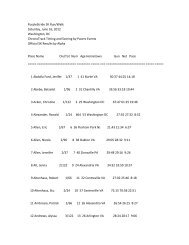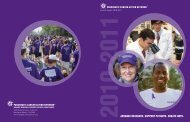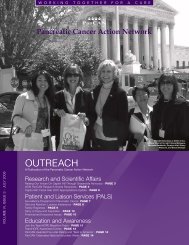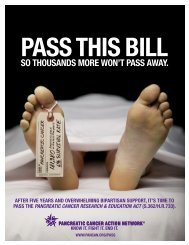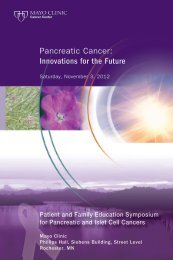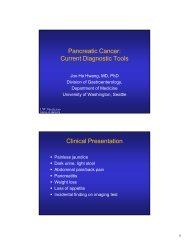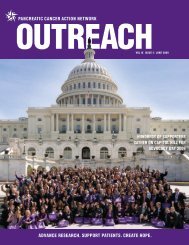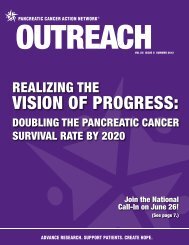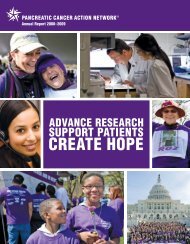outreach - Pancreatic Cancer Action Network
outreach - Pancreatic Cancer Action Network
outreach - Pancreatic Cancer Action Network
Create successful ePaper yourself
Turn your PDF publications into a flip-book with our unique Google optimized e-Paper software.
OUTREACHVol XI<br />
issue I february 2011<br />
The Vision of Progress:<br />
Double the <strong>Pancreatic</strong> <strong>Cancer</strong><br />
Survival Rate by 2020.<br />
An achievable goal, employing a comprehensive<br />
approach that combines research and support<br />
for those living with pancreatic cancer along with<br />
sustained community education and advocacy.<br />
See Page 4.<br />
Eight-year pancreatic cancer survivor Jeff Ross<br />
with fellow five-year survivor Julie Lopp<br />
February 2011 OUTREACH 1
CHAIR’S MESSAGE<br />
DOUBLING THE SURVIVAL RATE BY 2020<br />
Dear <strong>Pancreatic</strong> <strong>Cancer</strong> <strong>Action</strong> <strong>Network</strong> Friends:<br />
As the new Chair of the organization’s National Board<br />
of Directors, I look forward to furthering the remarkable<br />
growth and development the organization experienced<br />
under the visionary guidance of outgoing Chair Jason<br />
Kuhn during the past four years. The 2010 fiscal year<br />
was indicative of Jason’s strong leadership abilities: In<br />
addition to providing the pancreatic cancer community<br />
with superior services, the organization saw a 34 percent increase in net revenue<br />
compared to 2009.<br />
I am especially excited about leading the organization at this very pivotal time<br />
in its history. This month, a new major initiative, detailed on page 4, is aimed at<br />
changing the odds in the fight to defeat the disease: The Vision of Progress:<br />
Double the <strong>Pancreatic</strong> <strong>Cancer</strong> Survival Rate by 2020.<br />
The only way to double survival rates is to know, fight and end pancreatic cancer in<br />
a comprehensive way. To achieve this goal, the <strong>Pancreatic</strong> <strong>Cancer</strong> <strong>Action</strong> <strong>Network</strong><br />
is intensifying its efforts to raise awareness, fund research, support patients and<br />
advocate for a national research strategy dedicated to finding a cure for the<br />
disease. This comprehensive approach will continue to include advancing research<br />
discoveries, accelerating support for patients and families, building and sustaining<br />
federal support to fight the disease and growing the national network of people<br />
dedicated to furthering the organization's mission.<br />
Of course, we all dream of the day when the five-year survival rate for pancreatic<br />
cancer will be close to 100 percent, but we must set achievable milestones along<br />
the way and put a "stake in the ground" for our patients. The five-year survival rate<br />
has not changed significantly in nearly 40 years, so doubling it within 10 years will<br />
be a notable achievement. Fulfillment of this goal will require the support of nearly<br />
everyone connected with the organization, so stay tuned to find out more about<br />
how you can make this bold new initiative become a reality.<br />
I deeply appreciate this opportunity to serve the pancreatic cancer community<br />
in an even greater capacity, and I look forward to meeting many more of you as I<br />
attend organizational events throughout this year.<br />
Sincerely,<br />
Peter Kovler<br />
Board Chair<br />
BOARD OF DIRECTORS<br />
Peter Kovler, Chair, Washington, D.C.<br />
Laurie MacCaskill, Vice Chair, Los Angeles<br />
Stephanie R. Davis, JD, MA,<br />
Sherman Oaks, Calif.<br />
Tim Ennis, Boca Raton, Fla.<br />
Julie Fleshman, JD, MBA, President & CEO,<br />
Los Angeles<br />
Stevan Holmberg, MBA, DBA, Potomac, Md.<br />
Jason Kuhn, Tampa, FL<br />
Jai Pausch, Hampton Roads, Va.<br />
Stuart Rickerson, Rancho Santa Fe, Calif.<br />
Cynthia Stroum, Founding Chair Emeritus,<br />
Seattle<br />
SCIENTIFIC ADVISORY BOARD<br />
David Tuveson, MD, PhD, Chair,<br />
Cambridge Research Institute/CRUK<br />
Dafna Bar-Sagi, PhD, New York University<br />
Teri Brentnall, MD, University of Washington<br />
Michael Hollingsworth, PhD,<br />
University of Nebraska Medical Center<br />
Ralph Hruban, MD, Johns Hopkins University<br />
Elizabeth Jaffee, MD, Johns Hopkins University<br />
Craig Logsdon, PhD,<br />
MD Anderson <strong>Cancer</strong> Center<br />
Margaret Mandelson, PhD,<br />
Fred Hutchinson <strong>Cancer</strong> Research Center<br />
Gloria Petersen, PhD, Mayo Clinic<br />
Margaret Tempero, MD,<br />
University of California, San Francisco<br />
Selwyn Vickers, MD, University of Minnesota<br />
Geoffrey Wahl, PhD, Salk Institute<br />
MEDICAL ADVISORY BOARD<br />
Jordan Berlin, MD, Chair,<br />
Vanderbilt-Ingram <strong>Cancer</strong> Center<br />
Marcia Canto, MD, Johns Hopkins University<br />
Christopher Crane, MD,<br />
MD Anderson <strong>Cancer</strong> Center<br />
Jason Fleming, MD,<br />
MD Anderson <strong>Cancer</strong> Center<br />
Jane Hanna, RN, OCN, Georgetown University<br />
Hospital<br />
Mokenge Malafa, MD, Moffi tt <strong>Cancer</strong> Center<br />
Julie Meddles, RD, LD,<br />
Ohio State University Medical Center<br />
Mary Mulcahy, MD,<br />
Northwestern University<br />
Eileen O’Reilly, MD, Memorial Sloan-Kettering<br />
<strong>Cancer</strong> Center<br />
Maria Petzel, RD, CSO, LD, CNSD,<br />
MD Anderson <strong>Cancer</strong> Center<br />
Vincent Picozzi, MD,<br />
Virginia Mason Medical Center<br />
Mark Pochapin, MD, Jay Monahan Center for<br />
Gastrointestinal Health<br />
Mark Talamonti, MD,<br />
NorthShore University HealthSystem<br />
OUR MISSION<br />
The <strong>Pancreatic</strong> <strong>Cancer</strong> <strong>Action</strong> <strong>Network</strong> is a nationwide network of people dedicated to working together<br />
to advance research, support patients and create hope for those affected by pancreatic cancer.<br />
Cover image: Angela Johnson<br />
www.redboatimages.com
THREE SUPPORTERS ASSUME KEY LEADERSHIP<br />
ROLES WITHIN THE ORGANIZATION<br />
In July 2010, three new volunteer leaders were named to<br />
head the principal advisory boards of the <strong>Pancreatic</strong> <strong>Cancer</strong><br />
<strong>Action</strong> <strong>Network</strong>.<br />
Peter Kovler, a noted<br />
philanthropist and a former<br />
journalist who is the producer<br />
of several award-winning<br />
documentaries, now serves<br />
as Chair of the National Board<br />
of Directors. David Tuveson,<br />
MD, PhD, who works at the<br />
Cambridge Research Institute<br />
in the United Kingdom, became<br />
Peter Kovler<br />
Chair of the organization’s<br />
Scientific Advisory Board. Jordan Berlin, MD, who works at<br />
the Vanderbilt-Ingram <strong>Cancer</strong> Center, became Chair of the<br />
Medical Advisory Board.<br />
“We are honored that Peter has broadened his role within<br />
the <strong>Pancreatic</strong> <strong>Cancer</strong> <strong>Action</strong> <strong>Network</strong> by assuming this<br />
pivotal leadership position and we look forward to his keen<br />
guidance,” said Julie Fleshman, President and CEO of the<br />
<strong>Pancreatic</strong> <strong>Cancer</strong> <strong>Action</strong> <strong>Network</strong>. “I know that with Peter’s<br />
considerable experience and insight, the organization will<br />
continue with its notable growth and development. I am also<br />
pleased that Drs. Tuveson and Berlin, both leading experts in<br />
their fields, have moved into these influential advisory roles.”<br />
Peter serves as the Director of the Marjorie Kovler<br />
Philanthropic Fund and as Chairman of the Board of the Blum-<br />
Kovler Foundation. (In 2006, the Blum-Kovler Foundation<br />
made a $500,000 contribution to the <strong>Pancreatic</strong> <strong>Cancer</strong><br />
<strong>Action</strong> <strong>Network</strong>, the largest single gift the organization had<br />
ever received up until that time.)<br />
He also serves as the Chairman of the Board of the Center<br />
for National Policy and is the founder of Chicago’s Marjorie<br />
Kovler Center for Survivors of Torture. With an impressive<br />
background in government affairs, Peter previously worked<br />
as an award-winning documentary producer, as well as an<br />
acclaimed editor, speech writer and reporter.<br />
In 1970, he lost his mother to pancreatic cancer, and now<br />
serves as a committed advocate to advancing research into<br />
the disease. He lives in Washington, D.C., with his wife, Judy.<br />
When the organization’s research grants program began<br />
in 2003, Dr. Tuveson was one of the first investigators to<br />
receive a grant. His <strong>Pancreatic</strong> <strong>Cancer</strong> <strong>Action</strong> <strong>Network</strong> –<br />
AACR – Career Development Award provided funding for<br />
the development of a mouse model that mimics human<br />
pancreatic cancer. At the time, Dr. Tuveson was an Assistant<br />
Professor of Medicine at the University of Pennsylvania,<br />
having completed his medical and graduate degrees at<br />
Johns Hopkins University.<br />
Through his study, Dr. Tuveson and his colleagues created<br />
a mouse that was genetically programmed to develop<br />
pancreatic tumors, following<br />
the same disease progression<br />
as humans. This exceptionally<br />
powerful resource has<br />
revolutionized researchers’<br />
abilities to study pancreatic<br />
cancer.<br />
In 2006, he moved his<br />
laboratory to the University of<br />
Cambridge and the Cambridge<br />
David Tuveson, MD, PhD<br />
Research Institute / <strong>Cancer</strong><br />
Research UK, where he serves as a Professor and Senior<br />
Group Leader. Recently, Dr. Tuveson’s laboratory published<br />
a new method to treat pancreatic cancer in mice, and this<br />
information has helped launch trials both in the U.S. and<br />
other countries. He continues to investigate new therapies<br />
for pancreatic cancer both in the patients he treats as a<br />
medical oncologist in Great Britain and in the mouse model.<br />
Dr. Tuveson joined the <strong>Pancreatic</strong> <strong>Cancer</strong> <strong>Action</strong> <strong>Network</strong><br />
Scientific Advisory Board in 2007.<br />
Dr. Berlin has served as Associate Professor and<br />
Clinical Director of Gastrointestinal (GI) Oncology at the<br />
Vanderbilt-Ingram <strong>Cancer</strong><br />
Center in Nashville, Tennessee<br />
since 1999. He is a leading<br />
pancreatic cancer medical<br />
oncologist whose clinical<br />
research efforts focus on novel<br />
treatment approaches for the<br />
disease.<br />
Dr. Berlin also serves<br />
as chair of the influential<br />
Gastrointestinal Intergroup<br />
Jordan Berlin, MD<br />
Pancreas <strong>Cancer</strong> Task Force<br />
that determines the agenda for cooperative intergroup clinical<br />
trials in the U.S. He believes in enrolling patients, whenever<br />
possible, in clinical trials to learn more about the most<br />
effective ways to treat gastrointestinal cancers. Improving<br />
treatments, while preserving the patient's ability to function<br />
normally, are among his professional goals. Dr. Berlin is the<br />
recipient of various awards and also serves on a number of<br />
national advisory committees.<br />
February 2011 OUTREACH 1
MEET A GRANTEE<br />
JONATHAN BRODY, PHD: AIMING TO PERSONALIZE PANCREATIC<br />
CANCER TREATMENT<br />
Dr. Brody is the recipient<br />
of the 2010 Skip Viragh –<br />
<strong>Pancreatic</strong> <strong>Cancer</strong> <strong>Action</strong><br />
<strong>Network</strong> – AACR Career<br />
Development Award.<br />
He took a somewhat<br />
untraditional path to entering<br />
the fi eld of biomedical<br />
research, completing his<br />
undergraduate studies<br />
at Skidmore College on a<br />
music scholarship and then<br />
Jonathan Brody, PhD<br />
majoring in history. Halfway<br />
through his college education, Dr. Brody felt drawn to the<br />
biological sciences, and volunteered to help in the laboratory<br />
of Steven Rosenberg, MD, PhD, Chief of Surgery at the<br />
National <strong>Cancer</strong> Institute, where he began studying tumor<br />
immunology. The volunteer position became a technician<br />
position, and later on Dr. Brody enrolled in the graduate<br />
program at Johns Hopkins University to pursue a PhD in<br />
Pathobiology. He now works as an Assistant Professor of<br />
Surgery at Jefferson Medical College in Philadelphia, has<br />
a joint appointment in Pathology, is a staff member of the<br />
Kimmel <strong>Cancer</strong> Center, and serves as co-director of the<br />
Jefferson <strong>Pancreatic</strong>, Biliary, and Related <strong>Cancer</strong>s Center<br />
there. Dr. Brody was also recently named Chair of Surgical<br />
Research at Jefferson Medical College.<br />
Once Dr. Brody made a commitment to focus on pancreatic<br />
cancer research, he displayed tireless passion and intellect<br />
in pursuing his goal, which has been daunting. Among<br />
the challenges of studying pancreatic cancer is the lack<br />
of effective treatment options. Some patients respond well<br />
to gemcitabine, the chemotherapeutic standard of care for<br />
pancreatic cancer, but many do not.<br />
Dr. Brody’s aim is to determine why some patients’ tumors<br />
respond better than others to this treatment, specifi cally<br />
focusing on a protein called HuR. Clinical data suggest that<br />
patients whose tumors express HuR typically experience<br />
better outcomes with gemcitabine treatment. The ultimate<br />
goal of investigators is to create individual therapeutic<br />
regimens that will work best for each patient. Dr. Brody’s<br />
work offers powerful and exciting insights into achieving that<br />
objective.<br />
He refers to his day-to-day work as “intellectually<br />
fascinating and all-encompassing”, yet still fi nds time to<br />
play an active role in supporting activities of the <strong>Pancreatic</strong><br />
<strong>Cancer</strong> <strong>Action</strong> <strong>Network</strong>. Dr. Brody has attended several<br />
<strong>Pancreatic</strong> <strong>Cancer</strong> Symposia, PurpleStrides, <strong>Pancreatic</strong><br />
<strong>Cancer</strong> Advocacy Day and other events, allowing him to<br />
interact with patients and caregivers. He said that these<br />
experiences “add the feeling and heart” to his research,<br />
and that, after an event, he “can’t wait to get back into the<br />
laboratory and put in long hours”.<br />
His funding from the <strong>Pancreatic</strong> <strong>Cancer</strong> <strong>Action</strong> <strong>Network</strong><br />
was the fi rst large grant he received as a principal investigator.<br />
Now in his third year of overseeing his own laboratory, Dr.<br />
Brody said that the timing of this grant was perfect. “It was<br />
great ‘bridge money’ to pave the way for future laboratory<br />
funding,” he stated. He added that the award serves<br />
to validate his work as well as that of his departmental<br />
colleagues, including his close collaborator Charles Yeo,<br />
MD, who recruited Dr. Brody to Jefferson from Johns Hopkins<br />
University.<br />
Dr. Brody added that working as a young scientist can<br />
be quite diffi cult, especially when pursuing investigations<br />
into a disease that is as challenging and poorly funded as<br />
pancreatic cancer. He is gratifi ed that the <strong>Pancreatic</strong> <strong>Cancer</strong><br />
<strong>Action</strong> <strong>Network</strong> strives to build a community of researchers<br />
dedicated to studying the disease, provides ongoing support<br />
for them, and creates an optimal environment in which to<br />
conduct critical investigations.<br />
2 February 2011 OUTREACH<br />
In memory of Skip Viragh<br />
“The fact that I know [the Viragh family] is supporting my work makes me even<br />
more inspired to help fi nd a cure and understand this disease. This award will<br />
allow me to have the confi dence and the resources to pursue my goal of being a<br />
full-time pancreatic cancer researcher devoted to fi nding a cure for this disease. I<br />
am honored and humbled to be a small part of the Viragh legacy.”<br />
—Jonathan Brody, PhD, expressing his gratitude to the Viragh family for his grant
NEW CHALLENGES, NEW OPPORTUNITIES<br />
Political pundits refer to what happened last November 2 as<br />
a “wave” election, where the balance of power shifted from<br />
one national party to another. Whether you consider it a<br />
new wave, a shock wave or an extreme makeover, one thing<br />
is certain: The new Congress offers both challenges and<br />
opportunities for the patients, families, physicians, scientists<br />
and other supporters who make up the <strong>Pancreatic</strong> <strong>Cancer</strong><br />
<strong>Action</strong> <strong>Network</strong>.<br />
The class of freshmen lawmakers sworn in during January<br />
is enormous by historical standards. Of the 435 members of<br />
the U.S. House of Representatives, 96 are newly-elected.<br />
In the Senate, 13 of that chamber’s 100 members are new<br />
arrivals.<br />
Many of these newly-elected members of Congress<br />
have never held political office before. While there is a good<br />
chance that their lives may have been touched by pancreatic<br />
cancer, they are probably unaware of the fact that it’s the<br />
fourth leading cause of cancer death in the U.S., and one of<br />
the few cancers where survival rates remain persistently low.<br />
Our challenge will be to educate all 109 of the new<br />
faces in Congress about one of the most lethal forms of<br />
cancer. They need to know that last year alone, more than<br />
43,000 Americans were<br />
diagnosed with pancreatic<br />
cancer and that 36,800<br />
lost their lives to it. They<br />
need to understand<br />
that while survival rates<br />
are improving for many<br />
other forms of cancer,<br />
Rep. Leonard Lance (R-NJ), left, with<br />
supporter Todd Cohen<br />
pancreatic cancer is<br />
the only one of the top<br />
ten cancer killers with a<br />
survival rate that lingers in the single digits at just six percent.<br />
This is a statistic that has barely changed in the past 40 years.<br />
These new members of Congress must be shown<br />
that more research is the only hope we have for changing<br />
the status quo. Today, the National <strong>Cancer</strong> Institute (NCI)<br />
devotes only two percent of its $5.1 billion budget to research<br />
on pancreatic cancer and awards too few pancreatic cancer<br />
research grants in nearly every important grant category.<br />
This must change.<br />
Last Congress, 247 representatives and 28 senators<br />
cosponsored the <strong>Pancreatic</strong> <strong>Cancer</strong> Research & Education<br />
Act (S.362/ H.R.733), a bill calling for the NCI to make<br />
conquering pancreatic cancer a higher priority by developing<br />
a long-term and comprehensive strategic plan for pancreatic<br />
cancer research. Unfortunately, Congress adjourned last<br />
year before the bill came up for a vote.<br />
The bill was reintroduced on February 16 in the U.S.<br />
House of Representatives by Rep. Anna Eshoo (D-CA) and<br />
Rep. Leonard Lance (R-NJ). Senator Sheldon Whitehouse<br />
(D-RI) also reintroduced the bill in the Senate that day.<br />
Convincing the new Congress to make pancreatic cancer<br />
research a higher priority will not be easy. The current fiscal<br />
and economic climate is prompting lawmakers to look for<br />
deep cuts in federal spending. In coming months, Congress<br />
will consider proposals to reduce federal spending back to<br />
2008 levels, requiring budget cuts of between $60 billion to<br />
$100 billion.<br />
As Congress works its way through this difficult process,<br />
our challenge will be to convince lawmakers that pancreatic<br />
cancer research is already under-funded and, for the sake of<br />
future generations, should not be cut.<br />
One of the best ways to educate lawmakers is by<br />
putting a face on the problem. Members of Congress will<br />
spend more time this year back in their home states and<br />
congressional districts. Plan to meet with them and let them<br />
know how pancreatic cancer has personally affected you,<br />
your family and loved ones. Most Members of Congress<br />
post information about their local Townhall Meetings or<br />
their office hours on their official website. Visit Senate.gov<br />
or House.gov to register for your members’ email updates.<br />
You can also use our online Advocacy <strong>Action</strong> Center at<br />
www.pancan.org/takeaction to contact them.<br />
Another effective way to convey your message is by<br />
attending the fifth annual <strong>Pancreatic</strong> <strong>Cancer</strong> Advocacy Day<br />
in Washington, D.C., on June 13 to 14, when hundreds of<br />
patients and families will converge on Capitol Hill. Use the<br />
occasion to recruit family and friends from your congressional<br />
district.<br />
Over the coming weeks and months, we will keep<br />
you abreast of events in Washington as well as alert you<br />
when you need to raise your voice.<br />
Fifth Annual <strong>Pancreatic</strong> <strong>Cancer</strong><br />
Advocacy Day<br />
June 13 and 14, 2011 • Washington, D.C.<br />
Learn more and register at www.pancan.org/AD2011<br />
JOIN US!<br />
February 2011 OUTREACH 3
DOUBLING THE SURVIVAL RATE BY 2020<br />
Look at pancreatic cancer and you’ll see something wrong.<br />
Survival rates have stayed in the single digits for 40 years. Today,<br />
the five-year survival rate remains at just 6 percent. We have a<br />
vision to change that—to double the survival rate by the year<br />
2020. Together, we can know, fight and end pancreatic cancer<br />
and create hope for a greater chance of survival for patients<br />
everywhere.<br />
“We are intensifying our efforts to raise awareness, fund<br />
research, support patients and advocate for a national research<br />
strategy dedicated to finding a cure by undertaking this bold<br />
new initiative,” said Julie Fleshman, President and CEO of the<br />
<strong>Pancreatic</strong> <strong>Cancer</strong> <strong>Action</strong> <strong>Network</strong>. “With the support of our<br />
dedicated constituents, I have no doubt we will make it happen.”<br />
The strategy consists of four components:<br />
Advance Research Discoveries. Medical advances do not<br />
happen through a scattershot approach, so we remain committed<br />
to building a comprehensive and coordinated pancreatic cancer<br />
research community to speed the acquisition of knowledge, share<br />
information and move findings into practice. We will continue to<br />
fund research grants that attract the most talented and promising<br />
young scientists to study the disease and re-engage scientists<br />
already in the field by funding their innovative research projects<br />
and creating a collaborative network for them to share discoveries<br />
with other researchers.<br />
Support Patients and Families. Our efforts to educate patients<br />
and family members about the disease so they can make informed<br />
medical decisions are also critical to making progress. We are<br />
increasing the capacity of our one-on-one patient support through<br />
our Patient and Liaison Services, or PALS, Program. Central to<br />
our aim of doubling the survival rate is intensifying our efforts<br />
to provide the latest and most accurate medical information for<br />
patients, encouraging them to enroll in clinical trials, and directing<br />
them to pancreatic cancer specialists.<br />
Build and Sustain Federal Support. Much progress has been<br />
made against other deadly diseases when privately funded<br />
research has been merged with a dedicated federal research<br />
strategy. At present, the federal government has no long-term,<br />
comprehensive research strategy for pancreatic cancer. It<br />
dedicates little funding to pancreatic cancer research relative to<br />
the other leading cancers. Our advocates will continue to educate<br />
Members of Congress about pancreatic cancer and encourage<br />
them to introduce and pass the <strong>Pancreatic</strong> <strong>Cancer</strong> Research<br />
& Education Act (S.362/ H.R.733), legislation that will spur the<br />
National <strong>Cancer</strong> Institute to develop and fund a long-term,<br />
comprehensive research strategy for developing early diagnostics<br />
and better treatments to increase survival rates.<br />
Mobilize Troops. Through the years, our volunteers and advocates<br />
have significantly heightened national awareness of pancreatic<br />
cancer while raising tens of millions of dollars to fund private<br />
research, directly support patients by providing information<br />
and education, educate those in the federal government about<br />
pancreatic cancer and the need for increased research funding.<br />
We’ll continue to expand our national network by providing people<br />
with the tools they need to educate, organize and empower others<br />
to know, fight and end this devastating disease.<br />
Look for more information in the coming months about our<br />
vision of progress to double the survival rate for pancreatic<br />
cancer patients by 2020.<br />
BOARD MEMBERS APPLAUD NEW 2020 GOAL<br />
When The Vision of Progress: Double the <strong>Pancreatic</strong> <strong>Cancer</strong> Survival Rate by 2020 was shared with the three advisory<br />
boards of the <strong>Pancreatic</strong> <strong>Cancer</strong> <strong>Action</strong> <strong>Network</strong> – the National Board of Directors, the Scientific Advisory Board<br />
and the Medical Advisory Board – the response was overwhelmingly positive. Here, three members convey their<br />
enthusiasm about the initiative and how they believe it will benefit the pancreatic cancer community.<br />
"This is an important and achievable goal and we all share the hope that the survival rate will more than double during this time<br />
period. There are well-known examples of such advances. Regarding childhood cancer, the five-year survival for acute lymphocytic<br />
leukemia was around 10 percent in the 1960s. It increased to approximately 25 percent in children diagnosed between<br />
1970 and 1974. The 30-month survival rate for testicular cancer increased from 22 percent during 1973 to 1976 to 56 percent<br />
during the period from 1977 to 1979. Congratulations on articulating this goal and raising the bar on the pace of progress."<br />
— Margaret Mandelson, PhD, Fred Hutchinson <strong>Cancer</strong> Research Center, Scientific Advisory Board<br />
"Congratulations...your choice to set an objective and quantifiable goal is perfectly appropriate. It will give everyone familiar<br />
with the organization a target and a metric by which to judge not only the progress of the <strong>Pancreatic</strong> <strong>Cancer</strong> <strong>Action</strong> <strong>Network</strong><br />
but the efforts of the entire scientific community as well. There should not be any hesitancy or reluctance to accept the challenge<br />
and set the goal. The benefits and energy derived by setting the goal outweigh any notion of risk if it is not achieved..."<br />
— Mark Talamonti, MD, NorthShore University HealthSystem, Medical Advisory Board<br />
"I think this is outstanding."<br />
— Jordan Berlin, MD, Vanderbilt-Ingram <strong>Cancer</strong> Center, Chair/Medical Advisory Board<br />
4 February 2011 OUTREACH
A STORY OF HOPE AND INSPIRATION<br />
MY HERO: MY DOG ZEUS<br />
By Rick Asbridge, Covington, GA<br />
My name is Rick and<br />
I'm a pancreatic cancer<br />
survivor. I am happy to<br />
say that I have been<br />
free of cancer since<br />
September 2007 when I<br />
underwent the Whipple<br />
procedure.<br />
The day I was<br />
diagnosed was the<br />
most terrifying day of<br />
my life. I served in the<br />
military for 21 years<br />
and was attached to<br />
a Special Warfare Unit<br />
with the U.S. Navy, but<br />
nothing I experienced<br />
Rick and his beloved dog, Zeus<br />
in combat compared<br />
to that day. I was at the lowest point I've experienced in my<br />
life and would have had great difficulty getting through this<br />
horrible time without my best friend and my “caregiver”, Zeus.<br />
Zeus is my 87-pound boxer and he is the closest friend<br />
and the best caregiver anyone could ever want. The day I was<br />
diagnosed, he knew something was wrong and would not<br />
leave my side. My dog would follow me everywhere I went and<br />
would lay with me with his head on my lap and just watch me.<br />
After I came home following my surgery, he was there<br />
once again, right next to me; he would not leave my side for<br />
anything! Zeus was there for me to talk to, no matter what time<br />
of day or night.<br />
He never judged me and always seemed to understand<br />
what I was saying and what I was going through. Without<br />
Zeus, I very seriously doubt that I would have recovered as<br />
fast as I did nor would I have made it through those long nights<br />
sitting up alone when I couldn't get to sleep, with my mind<br />
racing. All I could think about was what was going on with my<br />
body. Then, I would think about what others with this cancer<br />
had gone through and still go through. Suddenly, I would start<br />
crying like I've never cried before in my life. Zeus patiently<br />
stayed with me.<br />
As I write these words right now, he is laying beside me<br />
on the floor, behaving like the great friend that he has always<br />
been. I know some of you may think I'm nuts talking about my<br />
dog being my caregiver, but I can tell you with all my heart I do<br />
not know where my health would be at this moment without<br />
God and Zeus. He has been such a godsend and a treasure in<br />
my life. It'll be hard to repay him for everything that he's done<br />
for me, but I am going to try.<br />
My only wish is that the cure for this and all other cancers<br />
in the world could be found soon so that nobody else or their<br />
loved ones will have to go through such a horrible experience.<br />
I thank the <strong>Pancreatic</strong> <strong>Cancer</strong> <strong>Action</strong> <strong>Network</strong> for all that they<br />
do in trying to raise awareness and bring this horrible cancer<br />
to light. I also want to thank them for giving us a chance to<br />
thank the heroes in our lives and sharing the stories that we<br />
have about them.<br />
Although a dog, Zeus has continually given me hope,<br />
lifted me up when I was down, and gave me a strong canine<br />
shoulder (or back) to cry on whenever I needed it. I owe him a<br />
great debt and love him with all my heart!<br />
PATIENT AND LIAISON SERVICES (PALS)<br />
PALS offers comprehensive, high-quality information and resources to patients and families facing<br />
pancreatic cancer, including information about the disease, treatments, clinical trials, side effect and<br />
symptom management, diet and nutrition, and support resources. Contact PALS for your personalized<br />
clinical trials search, pancreatic cancer information or for a free educational packet.<br />
El programa de PALS esta disponible en español.<br />
Patient and Liaison Services (PALS)<br />
Monday - Friday, 7am - 5pm Pacific Time<br />
February 2011 OUTREACH 5<br />
Toll-free: 877-272-6226 | E-mail: pals@pancan.org
KNOW YOUR PANCREATIC ENZYME PRODUCTS<br />
<strong>Pancreatic</strong> enzymes are<br />
natural chemicals produced<br />
by the pancreas that help<br />
break down fats, proteins and<br />
carbohydrates during digestion.<br />
Frequently, pancreatic cancer<br />
patients suffer from pancreatic<br />
insufficiency, or the inability<br />
of the pancreas to produce<br />
enough enzymes to break down food.<br />
<strong>Pancreatic</strong> insufficiency may cause the following symptoms:<br />
• feelings of indigestion<br />
• cramping after meals<br />
• large amounts of gas<br />
• foul-smelling gas or stools<br />
• floating or greasy/fatty stools<br />
• diarrhea<br />
• weight loss<br />
Doctors sometimes prescribe pancreatic enzyme products<br />
to patients who suffer from pancreatic insufficiency.<br />
<strong>Pancreatic</strong> enzyme products are available in prescription<br />
and over-the-counter forms. Different brands of prescription<br />
pancreatic enzyme products are not identical. The United<br />
States Food and Drug Administration, or FDA, has mandated<br />
that all prescription pancreatic enzyme products must pass<br />
FDA approval to ensure their effectiveness, safety and<br />
manufacturing consistency. For more information on the FDA<br />
approval process, visit their website at www.fda.gov, and<br />
search for “Updated Questions and Answers for Healthcare<br />
Professionals and the Public: Use an Approved <strong>Pancreatic</strong><br />
Enzyme Product (PEP).”<br />
To date, brands approved by the FDA for use in the U.S. are<br />
Creon®, Pancreaze and Zenpep®. Other brands that are<br />
still under review are Pancrecarb®, Ultrase® and Viokase®.<br />
Although the FDA has not yet approved these products, they<br />
may still be available in some pharmacies. However, they can<br />
no longer be manufactured in the U.S. until they are approved<br />
by the FDA.<br />
Over-the-counter pancreatic enzyme products are available<br />
without prescription. These enzymes are classified as dietary<br />
supplements rather than drugs, so the FDA regulates them<br />
under a different set of guidelines. While these products<br />
must also be deemed safe, manufacturing consistency from<br />
one batch to the next is not assessed.<br />
Consult a doctor or dietitian to find out if pancreatic enzyme<br />
supplements are right for the patient and for advice on which<br />
pancreatic enzyme product to use.<br />
The recommended type and dose of pancreatic enzymes<br />
must be chosen for each patient. In addition, some people<br />
may adapt to different doses of enzymes over time. Although<br />
the appropriate type and dose of pancreatic enzymes varies<br />
from person to person, some general recommendations for<br />
optimizing the effectiveness of pancreatic enzymes include:<br />
• Taking enzymes with every meal or snack that contains<br />
fat, especially meat, dairy, bread and desserts.<br />
• Starting with the smallest dose necessary and adjusting<br />
according to the severity of pancreatic insufficiency.<br />
• Taking the enzymes at the beginning of a meal or snack.<br />
Enzymes can also be taken throughout the meal. If<br />
enzymes are forgotten and only taken at the end of the<br />
meal, they generally do not work well.<br />
• Swallowing intact tablets and capsules with liquid at<br />
mealtimes. They should not be crushed or chewed<br />
unless you are directed to do so by a member of your<br />
medical team.<br />
• Using enzymes prior to their expiration date; they may<br />
become less effective as they get older.<br />
The most common side effect of pancreatic enzymes is<br />
constipation. Although less common, other side effects of<br />
enzymes include nausea, abdominal cramps or diarrhea.<br />
Discontinue the use of pancreatic enzymes if any signs of<br />
hypersensitivity or allergic reactions appear. Please note<br />
that beef, pork, pineapple and/or papaya may be used in the<br />
preparation of enzymes.<br />
For more information, contact a PALS Associate toll-free at<br />
877-272-6226 or email pals@pancan.org. PALS Associates<br />
are available Monday-Friday 7am-5pm Pacific Time.<br />
UPCOMING PANCREATIC CANCER SYMPOSIA<br />
Join us for a day of education and information presented by leaders in the field and enjoy networking with<br />
other patients, survivors, caregivers and family members.<br />
Washington, D.C.<br />
March 19/ Renaissance Washington, D.C.<br />
Chicago<br />
April 15/ Hyatt Regency Chicago<br />
Seattle<br />
May 20/ Sheraton Seattle Hotel<br />
Please<br />
6<br />
visit our website at www.pancan.org for more information.<br />
February 2011 OUTREACH<br />
Also look online for information about additional educational lectures taking place around the country this spring.
WHY ALL PANCREATIC CANCER PATIENTS<br />
SHOULD CONSIDER CLINICAL TRIALS<br />
<strong>Pancreatic</strong> cancer clinical trials are research studies that<br />
investigate new treatments or early detection methods to<br />
determine whether they are beneficial. These studies play<br />
an important role in advancing research and finding more<br />
effective treatments for pancreatic cancer. The <strong>Pancreatic</strong><br />
<strong>Cancer</strong> <strong>Action</strong> <strong>Network</strong> recommends that all pancreatic<br />
cancer patients consider clinical trials when exploring<br />
treatment options.<br />
Clinical trials may be conducted using completely new<br />
treatments or treatments that are already available. Since<br />
all cancers are different, a drug that is already approved by<br />
the United States Food and Drug Administration, or FDA, for<br />
the treatment of one type of cancer may not be approved<br />
to treat pancreatic cancer. In order to obtain FDA approval<br />
for treating pancreatic cancer, a drug must pass through the<br />
clinical trial process involving patients who have pancreatic<br />
cancer. Clinical trials are the safest and quickest way to<br />
confirm whether new treatments are actually beneficial for<br />
patients.<br />
Safe and effective treatment is the goal for both clinical<br />
trial participants and for the researchers who provide the<br />
treatments. Several mandatory steps are followed to protect<br />
participants. First, in cancer clinical trials, placebos are never<br />
used in place of the standard treatment for a given cancer.<br />
Also, in order to participate in any clinical trial, the FDA<br />
requires that an individual read and sign an informed consent<br />
form. This procedure ensures that patients receive complete<br />
information about a clinical trial prior to their participation and<br />
that they have key facts of the study to read and discuss with<br />
their families and doctors.<br />
Clinical trials are important because they determine whether<br />
a new and potentially better treatment is safe and effective.<br />
The trials may provide opportunities for patients to receive<br />
a promising drug or treatment while receiving care by top<br />
doctors and researchers at leading healthcare facilities.<br />
Additionally, clinical trials may offer treatments that have<br />
better results than currently approved treatments.<br />
FINDING A CLINICAL TRIAL<br />
Each clinical trial has specific enrollment guidelines that must<br />
be met by each patient in order for him/her to participate.<br />
Generally, participants must meet a list of standard<br />
requirements such<br />
as type and stage<br />
of cancer, prior<br />
treatments received,<br />
age, medical history<br />
and current medical<br />
condition. The<br />
purpose of these<br />
criteria is to identify<br />
a patient population<br />
with enough in common to be able to determine whether or<br />
not the treatment is effective.<br />
The <strong>Pancreatic</strong> <strong>Cancer</strong> <strong>Action</strong> <strong>Network</strong>’s Patient and Liaison<br />
Services, or PALS, program maintains a comprehensive<br />
database containing up-to-date information about pancreatic<br />
cancer clinical trials taking place throughout the United<br />
States. Our PALS Associates can perform a personalized<br />
search of the clinical trials database and provide patients<br />
with a list of clinical trials that may be appropriate for them.<br />
This service allows patients to take their personalized search<br />
results to their doctor to discuss all of their treatment options.<br />
For a free personalized clinical trials search or for<br />
other questions related to clinical trials, contact a<br />
PALS Associate toll-free at 877-272-6226 or email<br />
pals@pancan.org. PALS Associates are available<br />
Monday-Friday 7am-5pm Pacific Time.<br />
Volunteer to Offer Support through the Survivor and Caregiver <strong>Network</strong><br />
Have you been diagnosed with or are you currently caring for someone with non-operable or<br />
metastatic pancreatic cancer and would like to lend support to others?<br />
The Survivor and Caregiver <strong>Network</strong> is a group of volunteers who communicate with other patients<br />
and caregivers by phone or email as a source of support, hope and inspiration.<br />
For more information about joining the Survivor and Caregiver <strong>Network</strong>, please contact Amanda Hine<br />
February 2011 OUTREACH 7<br />
toll-free at 877-272-6226 or email her at ahine@pancan.org.
EVENTS SUMMARY<br />
OCTOBER TO DECEMBER 2010<br />
ALABAMA<br />
PurpleBowl Birmingham 2010, 11/20/2010<br />
CALIFORNIA<br />
PurpleLight Orange County 2010, 11/10/2010<br />
Awareness Night with the San Jose Sharks, 11/11/2010<br />
PurpleStride San Diego 2010, 11/13/2010<br />
PurpleStride Orange County 2010, 11/13/2010<br />
PurpleLight Pasadena 2010, 11/19/2010<br />
Awareness Night with the Los Angeles Kings, 11/27/2010<br />
PurpleLight Manhattan Beach 2010, 11/29/2010<br />
COLORADO<br />
PurpleLight Pagosa Springs 2010, 11/6/2010<br />
PurpleLight Denver 2010, 11/6/2010<br />
CONNECTICUT<br />
PurpleStride Danbury 2010, 11/7/2010<br />
FLORIDA<br />
Hockey Fights <strong>Cancer</strong> with the Florida Panthers, Sunrise,<br />
10/21/2010<br />
4th Annual Night of Hope - Tampa Bay 2010, 11/4/2010<br />
Purple Stride South Florida, Davie, 11/6/2010<br />
PurpleStride Orlando 2010, 11/7/2010<br />
GEORGIA<br />
PurpleStride Savannah 2010, Tybee Island, 11/6/2010<br />
PurpleStride Atlanta 2010, 11/13/2010<br />
IDAHO<br />
PurpleLight Boise 2010, 11/13/2010<br />
ILLINOIS<br />
6th Annual "Time for Hope" Benefi t, Oak Forest, 10/17/2010<br />
Celebrate Life for Hope 2010, Mokena, 11/6/2010<br />
INDIANA<br />
PurpleLight Indianapolis 2010, 11/13/2010<br />
KANSAS<br />
Night of Hope Kansas City 2010, Mission, 11/13/2010<br />
LOUISIANA<br />
PurpleStride Lake Area 2010, Lake Charles, 12/4/2010<br />
MARYLAND<br />
PurpleStride Maryland 2010, Cockeysville, 10/10/2010<br />
MICHIGAN<br />
Awareness Day with the Detroit Lions, Detroit, 11/7/2010<br />
MINNESOTA<br />
PurpleLight Twin Cities 2010, St. Paul, 11/16/2010<br />
MISSOURI<br />
PurpleStride St. Louis 2010, 10/17/2010<br />
NEBRASKA<br />
PurpleLight Omaha 2010, 11/7/2010<br />
NEW JERSEY<br />
PurpleStride New Jersey 2010, Parsippany, 11/7/2010<br />
NEW YORK<br />
Awareness Night with the New York Islanders, Uniondale,<br />
10/16/2010<br />
NORTH CAROLINA<br />
PurpleStride Raleigh Durham 2010, 11/7/2010<br />
OHIO<br />
PurpleLight Cincinnati 2010, 11/7/2010<br />
Raise Your Glass for a Cure, Powell, 11/11/2010<br />
OREGON<br />
PurpleStride Portland 2010, 11/7/2010<br />
PENNSYLVANIA<br />
PurpleStride Philadelphia 2010, 11/6/2010<br />
Cheers! to a Cure, Scranton, 11/13/2010<br />
Pizza for <strong>Pancreatic</strong> <strong>Cancer</strong>, Scranton, 11/15/2010-<br />
11/18/2010<br />
Awareness Night with the Wilkes-Barre/Scranton Penguins,<br />
11/27/2010<br />
RHODE ISLAND<br />
PurpleLight Providence 2010, 11/13/2010<br />
TENNESSEE<br />
PurpleStride Chattanooga 2010, 10/9/2010<br />
8 February 2011 OUTREACH
TEXAS<br />
Dallas Stars Fight <strong>Cancer</strong>, Dallas, 10/23/2010<br />
PurpleStride San Antonio 2010, 11/6/2010<br />
PurpleLight Austin 2010, 11/9/2010<br />
PurpleStride DFW 2010, Dallas, 11/14/2010<br />
VIRGINIA<br />
PurpleBowl Tidewater 2010, Virginia Beach, 11/13/2010<br />
<strong>Pancreatic</strong> <strong>Cancer</strong> is a Drag, Richmond, 11/20/2010<br />
WASHINGTON<br />
PurpleStride Puget Sound 2010, Seattle, 11/7/2010<br />
WEST VIRGINIA<br />
Purple Scarf of Hope 2010, Buckhannon, 11/1/2010<br />
WISCONSIN<br />
Jazzed for Hope 2010, Madison, 11/6/2010<br />
Purple Passion and Fashion, Milwaukee, 11/13/2010<br />
CONGRATULATIONS TO OUR VOLUNTEER LEADERS<br />
Thank you to the following core role volunteers, who began in their new positions from September 1, 2010 to<br />
December 31, 2010.<br />
Alan Allred, Advocacy Coordinator, Charlotte<br />
Michelle Allred, Advocacy Coordinator, Charlotte<br />
Cynthia Alte, Media Representative, Indianapolis<br />
Kristen Angell, Affiliate Coordinator, Connecticut<br />
Lauren Ballough, Event Coordinator, Manhattan<br />
Amy Boettcher, Event Coordinator, Cincinnati<br />
Heather Bowman, Community Representative, Wichita<br />
Ian Campbell-Laing, Event Coordinator, Connecticut<br />
Ariane Chapple, Event Coordinator, Bay Area<br />
Lauren Chekanow, Media Representative, Atlanta<br />
Eric Constantino, Event Coordinator, Rhode Island<br />
Gregory Corcoran, Education and Outreach<br />
Coordinator, Delaware<br />
Sheila Cosgrove, Affiliate Coordinator, New Jersey<br />
Laura Cross, Affiliate Coordinator, Milwaukee<br />
Kelly Cummings, Education and Outreach Coordinator,<br />
Des Moines<br />
Laura Daskalova, Community Representative,<br />
Lexington<br />
Janet Dixon, Community Representative, Columbus<br />
Maija Eerkes, Advocacy Coordinator, Puget Sound<br />
Dawn Eig, Affiliate Coordinator, Manhattan<br />
Kathryne Evans, Community Representative,<br />
Little Rock<br />
Carol Foreman, Community Representative, Paducah<br />
Mike Gau, Affiliate Coordinator, San Diego<br />
Deborah Hsieh, Advocacy Coordinator, Manhattan<br />
Julie Linse, Education and Outreach Coordinator,<br />
Oklahoma<br />
Gemma Lockwood, Education and Outreach<br />
Coordinator, Tidewater<br />
Mary Jo Mahowald, Advocacy Coordinator, Twin Cities<br />
Anita Marks, Event Coordinator, Miami<br />
Melissa Mason, Event Coordinator, Atlanta<br />
Laura Miller, Event Coordinator, Nashville<br />
Whitney Patz, Media Representative, Charlotte<br />
Jacob Seal, Event Coordinator, Boston<br />
Angela Searcy, Education and Outreach Coordinator,<br />
Nashville<br />
Cheryl Silver, Media Representative, Madison<br />
Natosha Southward, Event Coordinator, Atlanta<br />
Jackie Starnes, Event Coordinator, Nashville<br />
Lori Turner, Education and Outreach Coordinator,<br />
Charlotte<br />
Allison Whisman, Advocacy Coordinator, Indianapolis<br />
Kerry Wiles, Education and Outreach Coordinator,<br />
Nashville<br />
David Witt, Affiliate Coordinator, Manhattan<br />
Chenoa Woods, Advocacy Coordinator, Portland<br />
Charlotte Garrett, Advocacy Coordinator, Kansas City<br />
February 2011 OUTREACH 9
TEAMING UP TO RAISE HOPE<br />
To witness the true power of teamwork, look no further<br />
than the <strong>Pancreatic</strong> <strong>Cancer</strong> <strong>Action</strong> <strong>Network</strong>’s signature<br />
PurpleStride ® events. In 2010, more than 2,400 teams<br />
participated in 36 PurpleStrides around the country, raising in<br />
excess of $3,300,000. Incredibly, at PurpleStride Philadelphia<br />
alone, 185 teams brought in more than $400,000!<br />
Teams are most often created to support or honor a loved<br />
one. Luke and Joe Eichinger formed “Team Eichinger” in<br />
memory of their father, Joe, who passed from pancreatic<br />
cancer in 2010.<br />
cancer in 2007 at age 28,” she said. “He is now a three-year<br />
survivor who still battles every day. We have a four-year-old<br />
daughter, Bella, who inspires us to keep going and to STRIDE<br />
as far as we can. David strides to walk Bella down the aisle<br />
(at her wedding) some day. I stride to reach the top of the<br />
Eiffel Tower with David. We all stride to find a cure for David<br />
and all those who battle this disease.”<br />
Luke Eichinger described the experience of participating in<br />
PurpleStride Puget Sound in November as empowering. “We<br />
had 117 members on our team. I created a Facebook page<br />
with a registration link, sent out electronic invitations to all<br />
of my friends, passed out registration forms at school, and<br />
e-mailed all of my father’s contacts asking them to donate or<br />
walk with us.<br />
“My brother’s fraternity turned out too, and we even had<br />
members of the Everett Rowing Association wear the<br />
PurpleStride T-shirts during their race,” he added. “We all<br />
started together, and walked as a large group under the sign<br />
‘Team Joe Eichinger.’ It was a really powerful experience. My<br />
dad has been my biggest inspiration and I know he would<br />
have been proud.”<br />
Team Allen actually had members who participated a<br />
thousand miles apart. On November 13, five team members<br />
walked in PurpleStride Orange County in California. The next<br />
day, 23 additional team members turned out for PurpleStride<br />
DFW in Texas.<br />
Team leader Jill Allen explained the motivation behind the<br />
team. “My husband, David, was diagnosed with pancreatic<br />
“Team Joe Eichinger” recruited 117 participants for PurpleStride<br />
Puget Sound.<br />
Workplace teams are also gaining momentum. At PurpleStride<br />
Detroit, the Oakland County Credit Union recruited more<br />
than 100 participants and surpassed their fundraising goal<br />
by raising over $10,500. Companies of all types form teams,<br />
from “Team Dicks Sporting Goods” at PurpleStride South Bay<br />
in California to “Freels Orthodontics” at PurpleStride Austin.<br />
Georgetown University Hospital was not only a sponsor of<br />
PurpleStride D.C., but they also recruited 45 participants for<br />
the event.<br />
To learn more about an upcoming PurpleStride event in<br />
your area, visit www.purplestride.org.<br />
SUPPORT YOUR LOCAL PURPLESTRIDE IN 2011<br />
In 2010, <strong>Pancreatic</strong> <strong>Cancer</strong> <strong>Action</strong> <strong>Network</strong> volunteers produced an impressive<br />
36 PurpleStride events across the country, raising more than $3.3 million to<br />
advance research, support patients and create hope for those facing the disease.<br />
Even more growth is anticipated in 2011, with over 50 PurpleStride events<br />
expected nationwide.<br />
To find out how you can help, visit www.pancan.org/volunteer and reach out to<br />
10 your local affiliate to learn about great volunteer opportunities February 2011 in your OUTREACH area.
THE 2010 TEMPUR-PEDIC ® HUGS BACK CAMPAIGN:<br />
IMMEASURABLE IMPACT OF A CORPORATE CHAMPION LEADER<br />
The <strong>Pancreatic</strong> <strong>Cancer</strong> <strong>Action</strong> <strong>Network</strong>’s first corporate<br />
champion, Tempur-Pedic, concluded the second year of its<br />
Tempur-Pedic Hugs Back campaign on January 24, 2011, when<br />
they committed to a $300,000 donation to the organization.<br />
Counting donations generated through the 2009 Hugs Back<br />
campaign, Tempur-Pedic will have contributed more than<br />
$800,000 to support vital scientific investigations funded<br />
through the <strong>Pancreatic</strong> <strong>Cancer</strong> <strong>Action</strong> <strong>Network</strong>’s research<br />
grants program. Tempur-Pedic raised the campaign funding<br />
with the support of its nationwide network of retailers.<br />
key part of heightening awareness of the campaign among<br />
our volunteer affiliates,” said Mary Jo Kennedy, Director<br />
of Community Outreach at the <strong>Pancreatic</strong> <strong>Cancer</strong> <strong>Action</strong><br />
<strong>Network</strong>. “When our volunteers see Tempur-Pedic and their<br />
retailers represented at their local and regional events, they<br />
realize the strength of their commitment to our mission.<br />
"Our PurpleStride events also present an ideal way for us<br />
to thank and support the retailers who have been such an<br />
important part of the Hugs Back campaign’s success during<br />
the past two years,” she added.<br />
Besides generating research funding, the 2010 Tempur-<br />
Pedic Hugs Back campaign also raised significant national<br />
awareness about pancreatic cancer and the <strong>Pancreatic</strong><br />
<strong>Cancer</strong> <strong>Action</strong> <strong>Network</strong> through multiple marketing,<br />
advertising and public relations channels. These included<br />
national print ads that appeared in several major magazines<br />
and newspapers, television and radio spots that participating<br />
retailers ran in their local/regional markets, and Hugs Back<br />
point-of-purchase displays the retailers used to educate their<br />
consumers about the cause.<br />
To learn more about how your company can become involved<br />
in the fight against pancreatic cancer on a local, regional or<br />
national level, email Brian at bdoremus@pancan.org.<br />
For more information about Tempur-Pedic, go to<br />
www.tempurpedic.com.<br />
“Participation in a cause-related marketing program is an ideal<br />
way for a socially responsible business to demonstrate public<br />
awareness of its values and its willingness to support a good<br />
cause,” said Brian Doremus, Director of Corporate Relations<br />
for the <strong>Pancreatic</strong> <strong>Cancer</strong> <strong>Action</strong> <strong>Network</strong>. “Through the<br />
Hugs Back campaign, Tempur-Pedic and their retail partners<br />
have established a powerful association between their brand<br />
and this disease that is beginning to capture the attention of<br />
corporations and consumers across the country.”<br />
In addition to the Hugs Back campaign, Tempur-Pedic retailers<br />
showed a presence at PurpleStride fundraising events<br />
around the country to promote the campaign. "Providing<br />
the retailers with exposure at our PurpleStride events is a<br />
From left, Mark Sarvary, CEO, Tempur-Pedic International, Inc.;<br />
Julie Fleshman, <strong>Pancreatic</strong> <strong>Cancer</strong> <strong>Action</strong> <strong>Network</strong> President and<br />
CEO; Rick Anderson, President, Tempur-Pedic North America,<br />
LLC; and <strong>Pancreatic</strong> <strong>Cancer</strong> <strong>Action</strong> <strong>Network</strong> Board Member<br />
Stuart Rickerson.<br />
ENLISTING CORPORATE SUPPORT<br />
The growth of our Corporate Champion program is primarily driven by developing<br />
relationships with key supporters within companies around the country. Volunteers,<br />
donors and advocates who support our cause can further these efforts by helping us to<br />
forge relationships within their own companies. Introductions to key business contacts<br />
aid us enormously as we work to build new corporate relationships.<br />
To find out how you can help us to create even more corporate champion opportunities,<br />
February 2011 OUTREACH call Brian Doremus in our Corporate Relations department at 877-272-6226. 11
ABBY SOBRATO: PAYING TRIBUTE TO A CHERISHED<br />
WIFE, MOTHER AND COMMUNITY VOLUNTEER<br />
Abby and John Sobrato<br />
Those who knew Abby Sobrato were as inspired by her<br />
benevolence as they were by her perpetually optimistic<br />
attitude toward life, according to her husband, John Sobrato.<br />
“Her nickname was Pollyanna after the character in the<br />
classic Disney movie, because she always strived to look for<br />
the best in everyone and every situation,” John said. “Abby<br />
chose to see everyone based on their strengths and good<br />
qualities,” which was just one of the many reasons the former<br />
special education teacher was so beloved in the community<br />
of Saratoga, California, where she resided with her family for<br />
many years.<br />
In addition to her roles as a devoted wife to John and<br />
a loving mother to her sons John and Jeff, Abby was also a<br />
passionate philanthropist, supporting many causes that were<br />
dear to her, especially those related to education.<br />
With a contagious enthusiasm, she often enlisted others<br />
to lend a hand with her charitable works. “Abby led by<br />
example and did not seek recognition,” said John. “She also<br />
always had a following of good friends that would become<br />
involved in her causes.”<br />
One institute in particular held a special place in the<br />
couple’s hearts: their alma mater, Santa Clara University,<br />
where they both served on the school’s Board of Regents.<br />
Abby also served on the university’s Capital Campaign<br />
Leadership Council, the Walden West Outdoor School<br />
Foundation, the Bellarmine Mothers’ Guild Board, and the<br />
Diocese of San Jose Capital Campaign Steering Committee.<br />
When her sons were children, she helped to fundraise for<br />
their schools as well.<br />
In recognition of her decades-long commitment to<br />
philanthropy in her community, Abby was honored with the<br />
Santa Clara Panhellenic Council’s 2010 Athena Award.<br />
After she was diagnosed with pancreatic cancer in<br />
October of 2009, Abby still maintained her optimism, which<br />
helped her distraught family cope as they supported her<br />
during her illness. When she succumbed to the disease in<br />
May 2010 at age 50, John considered ways to honor her<br />
memory.<br />
As a tribute to her philanthropic spirit, John decided to<br />
fund the Abby Sobrato – <strong>Pancreatic</strong> <strong>Cancer</strong> <strong>Action</strong> <strong>Network</strong><br />
– Innovative Grant Award this year. Totaling $200,000,<br />
the two-year Innovative Grants are intended to further the<br />
development of new and innovative approaches to treating<br />
the disease, including those that have shown promise in<br />
combatting other forms of cancer.<br />
“The outcomes are so terrible for this disease, it seemed<br />
to me that the best thing I could do was to support research,”<br />
John said. “I felt one of the most effective ways I could help was<br />
through the <strong>Pancreatic</strong> <strong>Cancer</strong> <strong>Action</strong> <strong>Network</strong>’s Innovative<br />
Grants program. This was an easy decision for me.”<br />
Tragically, pancreatic cancer affected John’s life again in<br />
July 2010, when a close family friend, Father Paul Locatelli,<br />
also passed from the disease.<br />
The death of Father Locatelli, who served as Santa Clara<br />
University’s president from 1988 to 2008, and then as its<br />
chancellor, spurred John to become even more committed<br />
to fighting pancreatic cancer. He now supports the annual<br />
Walk 4 <strong>Pancreatic</strong> <strong>Cancer</strong>, which has been held for the past<br />
two years at Santa Clara University and benefits the UCSF<br />
(University of California San Francisco) <strong>Pancreatic</strong> Research<br />
Foundation.<br />
John is anxious for pancreatic cancer research to<br />
progress. “Until doctors have better tools at their disposal, we<br />
will see limited success in advancing treatments,” he said.<br />
KEEP THE MEMORY ALIVE<br />
CREATE A LEGACY GIFT<br />
A legacy gift ensures that your estate will<br />
benefit countless lives affected by pancreatic<br />
cancer. To learn more about creating a<br />
bequest, or other planned-giving options,<br />
A wonderful way to pay ongoing<br />
tribute to your loved one while raising<br />
awareness and funding for the fight<br />
against pancreatic cancer.<br />
please contact Pamela Acosta Marquardt at<br />
12 February 2011 OUTREACH<br />
www.firstgiving.com/keepthememoryalive<br />
pmarquardt@pancan.org or at 877-272-6226.
HUNDREDS OF GENEROUS SUPPORTERS GATHER FOR<br />
THE 13TH ANNUAL AN EVENING WITH THE STARS GALA<br />
The Hyatt Regency Century Plaza Hotel in Los Angeles<br />
served as the elegant setting for the 13th annual An Evening<br />
with the Stars gala, where nearly 600 supporters gathered<br />
on October 30, 2010, to acknowledge five extraordinary<br />
heroes for their own special contributions to the efforts to<br />
defeat pancreatic cancer. The inspirational event grossed<br />
more than $800,000, which will be used to fund critical<br />
programs and research projects for the pancreatic cancer<br />
community.<br />
During the gala, honorees shared their own touching<br />
stories about losing loved ones to the disease. Longtime<br />
donor and supporter Cindy Landon, whose husband<br />
Michael Landon passed from pancreatic cancer in 1991, was<br />
acknowledged with the Emily Couric Public Service Award<br />
for her many contributions to the <strong>Pancreatic</strong> <strong>Cancer</strong> <strong>Action</strong><br />
<strong>Network</strong> as well as a host of other worthy charities.<br />
Later, siblings Linda Daly, Robert Daly, Jr. and Brian Daly<br />
were recognized with the inaugural Nancy M. Daly Shining<br />
Star Award, a new honor created as a tribute to their mother,<br />
a celebrated Los Angeles-area philanthropist who passed<br />
from pancreatic cancer in 2009.<br />
In another evening highlight, the <strong>Pancreatic</strong> <strong>Cancer</strong><br />
<strong>Action</strong> <strong>Network</strong>’s national spokesperson, Lisa Niemi Swayze,<br />
was presented with the Spirit of Hope Award in recognition<br />
of her ongoing efforts to heighten awareness during her<br />
husband Patrick Swayze’s highly publicized battle with the<br />
disease and after his passing in 2009.<br />
“As always, we are extremely grateful to everyone who<br />
supports our annual gala,” said Julie Fleshman, President<br />
and CEO of the <strong>Pancreatic</strong> <strong>Cancer</strong> <strong>Action</strong> <strong>Network</strong>, who<br />
lost her own father to the disease. “Each year, this occasion<br />
allows us to remember all of those we have lost to pancreatic<br />
cancer, and provides us with an opportunity to raise critical<br />
funding to bring us even closer to finding a cure.”<br />
Lisa Niemi Swayze addresses the crowd as she accepts the Spirit of Hope Award.<br />
From left, Sean Landon, Emily Couric Public Service Award honoree Cindy<br />
Landon, and Jennifer Landon<br />
From left, Nancy M. Daly Shining Star Award honorees Robert Daly, Jr.,<br />
Linda Daly and Brian Daly<br />
Evening host Tony Potts, Access Hollywood<br />
SAVE THE DATE:<br />
AN EVENING WITH THE STARS 14 TH ANNUAL GALA<br />
BEVERLY HILLS, CALIF. OCTOBER 22, 2011<br />
February 2011 OUTREACH 13
1500 Rosecrans Ave., Ste 200, Manhattan Beach, CA 90266<br />
Non-Profit Org<br />
US Postage<br />
paid<br />
Torrance, CA<br />
Permit No.473<br />
*PLEASE NOTE OUR NEW ADDRESS<br />
WELCOME THE NEW<br />
YEAR IN PURPLE<br />
We invite you to visit our Online Store and<br />
shop for the most up-to-date awareness<br />
items. We have significantly expanded our<br />
selections of apparel, fashion accessories,<br />
pins, and much more.<br />
www.pancan.org/store<br />
Calendar of events*<br />
ELECTRONIC SERVICE REQUESTED<br />
If your address is incorrect, or you are receiving duplicate copies<br />
of this publication, you may submit changes in one of three ways:<br />
e-mail change@pancan.org; update the label and mail it to Outreach/<br />
PanCAN, 1500 Rosecrans Ave., Suite 200, Manhattan Beach,<br />
CA 90266; or call 877-272-6226. By giving the code number that<br />
appears above your name, your request can be processed quickly.<br />
Thank you for helping us to manage our expenses.<br />
Date Event Name City, State Contact<br />
4/23/2011 PurpleStride Kansas City Kansas City, MO Lindsey McDonald lmcdonald@pancanvolunteer.org<br />
4/30/2011 PurpleStride Chicago 2011 Chicago, IL Maureen Feck mfeck@pancanvolunteer.org<br />
5/14/2011 PurpleStride Los Angeles 2011 El Segundo, CA Danielle Dietz ddietz@pancanvolunteer.org<br />
5/15/2011 PurpleStride Rhode Island Providence, RI Kim Trupiano ktrupiano@pancanvolunteer.org<br />
5/19/2011 PurpleLinks Atlanta Atlanta, GA Melissa Mason mmason@pancanvolunteer.org<br />
5/21/2011 PurpleStride Tampa Bay 2011 Tampa Bay, FL Tracy Connolly tconnolly@pancanvolunteer.org<br />
5/21/2011 5th Annual Celebration of Hope Seattle, WA Jennifer Donahue jdonahue@pancanvolunteer.org<br />
5/22/2011 PurpleStride Manhattan 2011 Manhattan, NY Lauren Ballough lballough@pancanvolunteer.org<br />
6/4/2011 PurpleStride Milwaukee Milwaukee, WI Julie Larsen jlarsen@pancanvolunteer.org<br />
6/11/2011 PurpleStride Omaha Omaha, NE Diane Pursel dpursel@pancanvolunteer.org<br />
6/11/2011 9th Annual Walk Through the Vineyards St. Helena, CA Michelle Monhart mmonhart@pancanvolunteer.org<br />
6/14/2011 5th Annual <strong>Pancreatic</strong> <strong>Cancer</strong> Advocacy Day Washington, DC Daphne Delgado at ddelgado@pancan.org<br />
6/18/2011 PurpleStride Cleveland Cleveland, OH Teresa Young tyoung@pancanvolunteer.org<br />
6/18/2011 PurpleStride Washington, DC 2011 Washington, DC Susan Okula sokula@pancanvolunteer.org<br />
6/25/2011 PurpleStride Indianapolis Indianapolis, IN Betsy Anteau banteau@pancanvolunteer.org<br />
6/25/2011 TEAMHOPE ® Seattle Half-Marathon Seattle, WA Katie Kachurak at kkachurak@pancan.org<br />
*For information about upcoming pancreatic cancer symposia, please turn to page 6.<br />
14 February 2011 OUTREACH<br />
join us on Facebook follow us on Twitter watch us on YouTube




